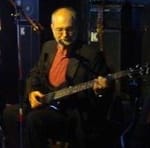- Posts: 142
- Thank you received: 5
Just as speakers can be distorted.....
- bjm362
-
 Topic Author
Topic Author
- Offline
- Premium Member
-

Less
More
15 years 11 months ago #8140
by bjm362
Just as speakers can be distorted..... was created by bjm362
So can the truth !
Fostex makes some nice speakers,but who ever wrote this article for them either is lying or has never listened to a properly implemented horn loaded system!
A speaker is an acoustic transducer and not a very good one unyil its loaded to a good horn!
Well designed and implemented horns als reduce first,second and third order harmonic distortion!
Here is what they had to say!
Enclosures--An Introduction
The drivers are only half the story. The enclosures you use are at least as important:
Over the many years that Fostex full-range drivers have been available, scores of different cabinets have been designed for them. Some of these are bass REFLEX enclosures and some are bass HORN enclosures. In our experience, everyone that hears these designs, side by side, prefers the sound of Fostex drivers in bass reflex cabinets.
For those of you unfamiliar with the term 'bass horn', it is a cabinet design where a small space BEHIND the driver starts very small but grows exponentially as it moves through the cabinet. The sound from the BACK of the driver follows this passageway as it winds back and forth and grows larger as it moves towards the exit. Eventually, it ends in a very large 'mouth'. This is actually called a 'folded' horn. If it were not folded, it would extend 6 feet or more into the room. . The theory behind them is similar to the way that a cheerleader uses a megaphone to lead cheers at a football game. The sound will be amplified when it finally exits the megaphone (or bass horn) at the 'mouth.' Historically, this design was created to get the most sound possible from low powered amplifiers. Unfortunately--just as the cheerleader's voice is distorted by the megaphone--so is the music.
Problems historically associated with bass horn speaker cabinets are as follows:
1. Horn-loaded designs tend to 'fatten' or 'smear' the midrange and upper bass regions of the music.
This is because the sound emanating from the BACK of the cone goes through the bass horn and reaches the listener AFTER the music from the FRONT of the cone. This time delay is especially pronounced with bass horns that exit at the front of the cabinet. All bass horns give a 'tubby' sound, one with exaggerated reverb affects. The single best feature of a full-range driver is the detail they are capable of reproducing. Much of this is either lost by cancellation or unnaturally enhanced by the sound coming from the bass horn.
2. Stereo imaging and soundstage is very poor with bass horn designs.
This is because there are three separate sound sources coming from both the left and right speakers (sound directly from the driver, from the bass horn, and from cabinet resonances caused by vibration). None of this information is time coherent. Each note on the recording arrives at three different times at the listener's ears (six, if you count both left and right speakers). This makes it very difficult to produce a precise stereo image? Historically, this was not important, because most of these designs date from the mono era. Before stereo, the concept of imaging didn't even exist.
3. Horn-loaded enclosures exhibit a ragged bass response.
Not the smooth response most people are used to--and prefer--from bass reflex enclosures. With each change in a third of an octave, bass horn enclosures may be up 8dB here, then down 6dB, then up another 7dB. They can end up making bass tones rather than clearly articulated bass notes.
4. Horn-loaded designs are very difficult--and expensive--to build, and hard to place in most rooms.
Most of them are also very large and unusual looking and have a very low WAF (wife acceptance factor!) Of course, this unusual appearance can be appealing for some people. And, of course, they can make an interesting and challenging woodworking project.
5. Horn-loaded designs do not play very low bass.
Our testing indicated that a bass reflex design will actually go significantly 'lower' in the bass region than almost all of the horn designs. All of our bass reflex enclosures are capable of flat response to 40 Hz (-3 dB) using boundary reinforcement, while almost all of the bass horn designs roll-off below 63 Hz.
6. There is no significant efficiency advantage with the bass horn designs.
The best are only around 1 or 2dB more efficient than a properly designed bass reflex enclosure.
7. It is possible to overdrive bass horns.
Drivers used in this type of enclosure can't have a lot of excursion and can't be driven too hard. If they are, the pressure builds up in the chamber behind the driver and produces distortion. If you really want thunderous bass and dynamics and bass response to 20 cycles or lower, it will be necessary to purchase a quality subwoofer.
Bass HORN Enclosures
Is there any situation where we could recommend a bass horn enclosure? Well, actually, there is one....
Classical music is unique in that the concert hall is an integral part of the enjoyment of the sound. It is virtually impossible to make a recording which can accurately capture a classical music performance. This is because when you sit in a concert hall, you hear many different sources of sound--the music coming directly from the orchestra--the reflections off side walls, the ceiling, the back of the hall--resonances coming from the floor under the orchestra and the hall itself. And stereo imaging is not an important element in orchestral works.
In this case, the colorations of a bass horn can mimic what goes on at a classical concert. It's not accurate, of course, but if it can simulate the actual event, then isn't that what's important? So, some of the liabilities of the bass horn design CAN become assets if many factors are carefully considered (like room placement, etc.)
There is a way to produce the same results with bass reflex enclosures and we have done so. By mounting a second driver on the top of the speaker--pointing up--it is possible to produce the same wide, spacious, ambient sound. Coincidentally, we call it the Fostex 2.5 'Ambience'! It produces a wonderful ambient presentation--much as the bass horns do--but without many of the problems mentioned previously. Many people prefer it to bass horn designs for classical music.
The Fostex 2.5 'Ambience' has better imaging, lower distortion, and all the accurate, realistic bass that can only be achieved with a bass reflex design. Of course, it doesn't image quite as well as the 'normal' bass reflex enclosure when both drivers are operating. But this tradeoff may be worth it for the increased ambience and sense of space that it offers. We believe that it is the best answer for classical music.
In addition, we recommend that this speaker be built with a switch for the top driver (so it can be turned off). With this switch, it is possible to have your cake and eat it too! You can operate the front driver for most 'normal' types of music. You can turn on the top driver when you listen to classical music. Using two drivers also gives a wonderful ambient sound for parties and for background music. The increased bass also makes the two driver setup preferable for more dynamic recordings.
Fostex makes some nice speakers,but who ever wrote this article for them either is lying or has never listened to a properly implemented horn loaded system!
A speaker is an acoustic transducer and not a very good one unyil its loaded to a good horn!
Well designed and implemented horns als reduce first,second and third order harmonic distortion!
Here is what they had to say!
Enclosures--An Introduction
The drivers are only half the story. The enclosures you use are at least as important:
Over the many years that Fostex full-range drivers have been available, scores of different cabinets have been designed for them. Some of these are bass REFLEX enclosures and some are bass HORN enclosures. In our experience, everyone that hears these designs, side by side, prefers the sound of Fostex drivers in bass reflex cabinets.
For those of you unfamiliar with the term 'bass horn', it is a cabinet design where a small space BEHIND the driver starts very small but grows exponentially as it moves through the cabinet. The sound from the BACK of the driver follows this passageway as it winds back and forth and grows larger as it moves towards the exit. Eventually, it ends in a very large 'mouth'. This is actually called a 'folded' horn. If it were not folded, it would extend 6 feet or more into the room. . The theory behind them is similar to the way that a cheerleader uses a megaphone to lead cheers at a football game. The sound will be amplified when it finally exits the megaphone (or bass horn) at the 'mouth.' Historically, this design was created to get the most sound possible from low powered amplifiers. Unfortunately--just as the cheerleader's voice is distorted by the megaphone--so is the music.
Problems historically associated with bass horn speaker cabinets are as follows:
1. Horn-loaded designs tend to 'fatten' or 'smear' the midrange and upper bass regions of the music.
This is because the sound emanating from the BACK of the cone goes through the bass horn and reaches the listener AFTER the music from the FRONT of the cone. This time delay is especially pronounced with bass horns that exit at the front of the cabinet. All bass horns give a 'tubby' sound, one with exaggerated reverb affects. The single best feature of a full-range driver is the detail they are capable of reproducing. Much of this is either lost by cancellation or unnaturally enhanced by the sound coming from the bass horn.
2. Stereo imaging and soundstage is very poor with bass horn designs.
This is because there are three separate sound sources coming from both the left and right speakers (sound directly from the driver, from the bass horn, and from cabinet resonances caused by vibration). None of this information is time coherent. Each note on the recording arrives at three different times at the listener's ears (six, if you count both left and right speakers). This makes it very difficult to produce a precise stereo image? Historically, this was not important, because most of these designs date from the mono era. Before stereo, the concept of imaging didn't even exist.
3. Horn-loaded enclosures exhibit a ragged bass response.
Not the smooth response most people are used to--and prefer--from bass reflex enclosures. With each change in a third of an octave, bass horn enclosures may be up 8dB here, then down 6dB, then up another 7dB. They can end up making bass tones rather than clearly articulated bass notes.
4. Horn-loaded designs are very difficult--and expensive--to build, and hard to place in most rooms.
Most of them are also very large and unusual looking and have a very low WAF (wife acceptance factor!) Of course, this unusual appearance can be appealing for some people. And, of course, they can make an interesting and challenging woodworking project.
5. Horn-loaded designs do not play very low bass.
Our testing indicated that a bass reflex design will actually go significantly 'lower' in the bass region than almost all of the horn designs. All of our bass reflex enclosures are capable of flat response to 40 Hz (-3 dB) using boundary reinforcement, while almost all of the bass horn designs roll-off below 63 Hz.
6. There is no significant efficiency advantage with the bass horn designs.
The best are only around 1 or 2dB more efficient than a properly designed bass reflex enclosure.
7. It is possible to overdrive bass horns.
Drivers used in this type of enclosure can't have a lot of excursion and can't be driven too hard. If they are, the pressure builds up in the chamber behind the driver and produces distortion. If you really want thunderous bass and dynamics and bass response to 20 cycles or lower, it will be necessary to purchase a quality subwoofer.
Bass HORN Enclosures
Is there any situation where we could recommend a bass horn enclosure? Well, actually, there is one....
Classical music is unique in that the concert hall is an integral part of the enjoyment of the sound. It is virtually impossible to make a recording which can accurately capture a classical music performance. This is because when you sit in a concert hall, you hear many different sources of sound--the music coming directly from the orchestra--the reflections off side walls, the ceiling, the back of the hall--resonances coming from the floor under the orchestra and the hall itself. And stereo imaging is not an important element in orchestral works.
In this case, the colorations of a bass horn can mimic what goes on at a classical concert. It's not accurate, of course, but if it can simulate the actual event, then isn't that what's important? So, some of the liabilities of the bass horn design CAN become assets if many factors are carefully considered (like room placement, etc.)
There is a way to produce the same results with bass reflex enclosures and we have done so. By mounting a second driver on the top of the speaker--pointing up--it is possible to produce the same wide, spacious, ambient sound. Coincidentally, we call it the Fostex 2.5 'Ambience'! It produces a wonderful ambient presentation--much as the bass horns do--but without many of the problems mentioned previously. Many people prefer it to bass horn designs for classical music.
The Fostex 2.5 'Ambience' has better imaging, lower distortion, and all the accurate, realistic bass that can only be achieved with a bass reflex design. Of course, it doesn't image quite as well as the 'normal' bass reflex enclosure when both drivers are operating. But this tradeoff may be worth it for the increased ambience and sense of space that it offers. We believe that it is the best answer for classical music.
In addition, we recommend that this speaker be built with a switch for the top driver (so it can be turned off). With this switch, it is possible to have your cake and eat it too! You can operate the front driver for most 'normal' types of music. You can turn on the top driver when you listen to classical music. Using two drivers also gives a wonderful ambient sound for parties and for background music. The increased bass also makes the two driver setup preferable for more dynamic recordings.
Please Log in or Create an account to join the conversation.
- deadbeat
-

- Offline
- Platinum Member
-

15 years 11 months ago #8164
by deadbeat
Beranek\'s law
\'bits of ply round a driver\'
Replied by deadbeat on topic Just as speakers can be distorted.....
I think they're thinking of scoops (rear loaded horns), eh?
Beranek\'s law
\'bits of ply round a driver\'
Please Log in or Create an account to join the conversation.
- jake_fielder
-

- Offline
- Elite Member
-

Less
More
- Posts: 170
- Thank you received: 0
15 years 10 months ago #8177
by jake_fielder
Replied by jake_fielder on topic Just as speakers can be distorted.....
All horns roll off at 63hz, and there is no significant sensitivity advantage.... hmm interesting
Please Log in or Create an account to join the conversation.
- bjm362
-
 Topic Author
Topic Author
- Offline
- Premium Member
-

Less
More
- Posts: 142
- Thank you received: 5
15 years 10 months ago #8181
by bjm362
Replied by bjm362 on topic Just as speakers can be distorted.....
Yeah its amazing just how far companies will stray from the truth to sell something isn't it
Please Log in or Create an account to join the conversation.
- jake_fielder
-

- Offline
- Elite Member
-

Less
More
- Posts: 170
- Thank you received: 0
15 years 10 months ago #8190
by jake_fielder
Replied by jake_fielder on topic Just as speakers can be distorted.....
Its honestly ridiculous, id be embarrased if my company were putting out that kind of rubbish info
Please Log in or Create an account to join the conversation.
- javierr3499
-

- Offline
- New Member
-

Less
More
- Posts: 3
- Thank you received: 0
15 years 10 months ago #8191
by javierr3499
Replied by javierr3499 on topic Just as speakers can be distorted.....
has any body built this before?
Time to create page: 0.327 seconds